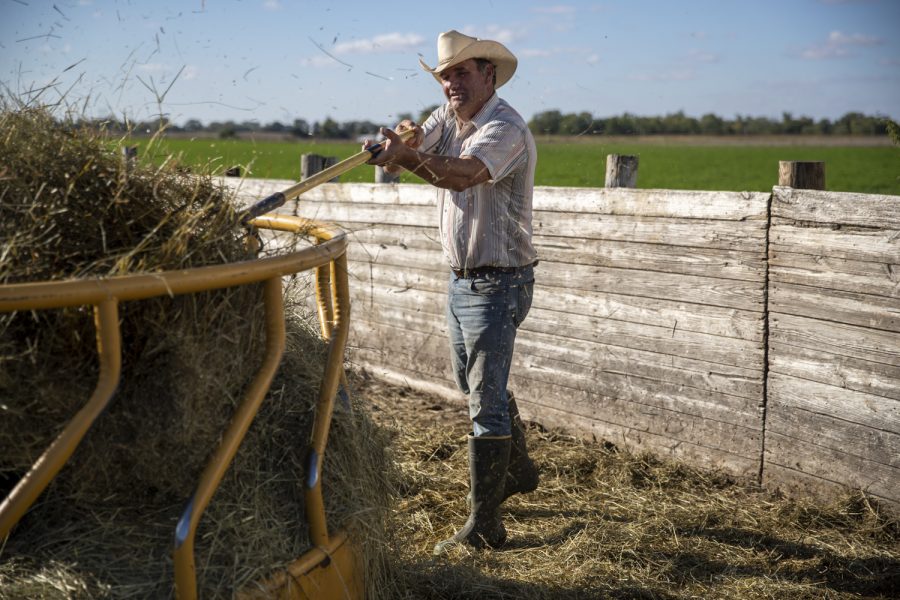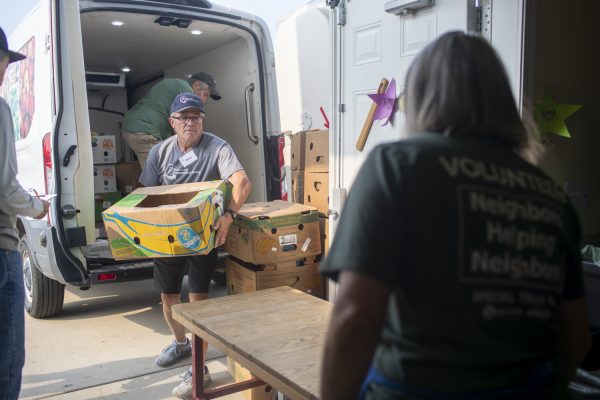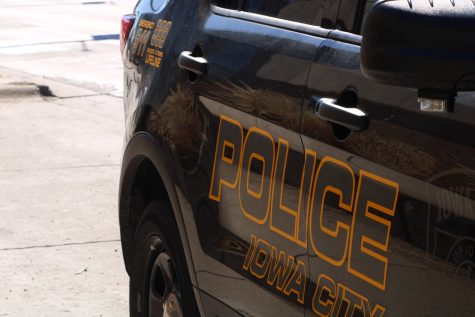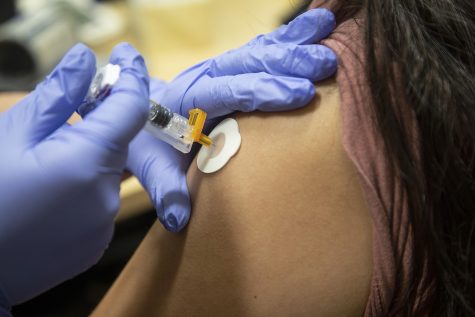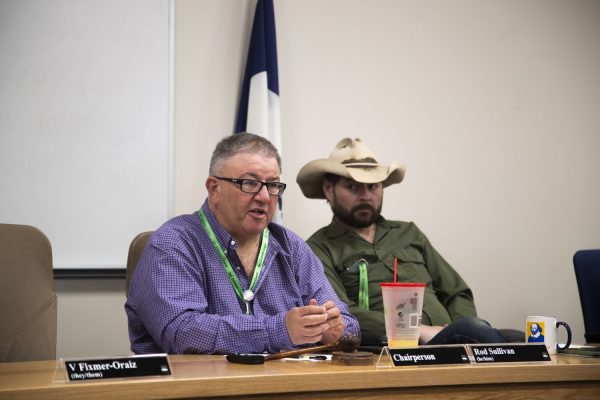Iowa agricultural community to benefit from grant expanding mental health programs
Mental health services targeted toward farmers will be better publicized and equipped using money from an Iowa Department of Agriculture grant beginning this year.
Steve Swenka moves hay with a pitchfork at Double G Angus Farms in Tiffin on Tuesday, Oct. 12, 2021. Swenka said the hay gets blown around and needs to be reorganized.
October 12, 2021
The phone number for the Iowa Concern Hotline, a hotline dedicated to providing mental health support to farmers, is 800-447-1985. The last four digits symbolize a year during one of Iowa’s largest farming crises.
The hotline, among other similar organizations across the state, will receive part of a $500,000 grant from the Iowa Department of Agriculture and Land Stewardship in partnership with Iowa State University Extension and Outreach. The hotline is run through the ISU office of Extension and Outreach.
ISU Vice President for Extension and Outreach John Lawrence said the hotline grew out of the 1980s, when there was an increase in stress and suicide among farmers.
The U.S. suffered an economic crisis in 1985, increasing interest rates dramatically and affecting farmers of the Midwest in particular. According to Iowa PBS, the nation’s farm debt in 1984 was double what it was in 1978, and net farm income decreased from $19 billion in 1950 to $5.4 billion in 1984.
“To have a place, a single place people could call, particularly the agricultural community, was important,” Lawrence said. “We’ve had this service for a long time.”
He said the Iowa Department of Agriculture and Land Stewardship, the Iowa Farm Bureau, and the Corn Growers, among other organizations, would point to the hotline over the years as a source for farmers experiencing financial, legal, or emotional stress.
Lawerence said the grant will allow the university to train people involved in the program across the state. He said staff members will network on a weekly basis, whether through ISU’s extension offices or other venues like the Rotary Club or Pork Producers banquet.
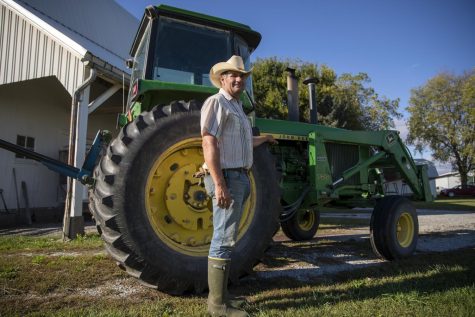
“The agricultural community and farmers in particular are kind of the stoic, independent [type], often working by themselves, and they’ll just work harder until things get better,” he said. “But mental health, much like other health issues, if you ignore it, it likely doesn’t get better.”
ISU Extension and Outreach Specialist David Brown said the grant will help pay eight different counterparts across the state to increase awareness among the agricultural community, such as co-ops, churches, and clinics. The Extension and Outreach division provides six different programs across the state that farm families can participate in at no cost, he said.
Brown added that one of his goals is to recruit individuals involved in agriculture themselves to teach the program’s new training courses.
RELATED: College of Public Health examines mental health challenges for farmers
Hotline reaches farmers in need
Brown said a moment that stuck out to him was when Lawrence told him of a conversation with a farmer considering suicide that called the Iowa Concern Hotline at 2 a.m. The farmer did not want to reach out to friends or family, for fear of waking them up.
“He actually found an Iowa Concern magnet on his refrigerator,” Brown said. “So he called at 2:00 in the morning and was able to talk to someone and get some resources. He chose to not make a suicide attempt just through some resources that were provided by Extension and Outreach.”
ISU Extension and Outreach Hotline Coordinator Tammy Jacobs said those working the hotline are paid employees, and currently the team has 10 members on staff.
She said, when people call the hotline, they are asked their zip code to gather demographics of who is calling from what county and determine what resources are available in those areas.
“We don’t have a script,” Jacobs said. “After that [getting their zip code], it just goes with the flow of what it is the caller wants to visit about.”
Jacobs said the hotline receives about 600 to 800 calls per month from every state in the country, not just Iowa. Over the past year, the hotline has received 50 calls from Johnson County farmers and related family members, she said.
“Generally, calls this time of the year drop down a bit. A couple of reasons is farmers are out in the field harvesting, so they’re busy,” she said. “…In the spring, when it’s planting and getting ready to plant, then we see that call volume drop again. So it’s kind of a roller coaster.”
In an interview with The Daily Iowan, Iowa Secretary of Agriculture Mike Naig said farmers are at a higher risk for mental health and stress given the fluctuating nature of agriculture markets.
“The uncertainty of markets and weather in farming can be an isolating business, too,” Naig said. “You’re oftentimes working on your own. So we just think that warrants or is a good reason to enhance the efforts around reaching out to those folks and providing even more resources to them.”
Brown said over the last five to 10 years, there have been multiple economic concerns relating to export screening around the world.
“Prices dropped dramatically a few years ago, as far as grain prices, corn, soybeans, particularly in Iowa,” Brown said. “The farmers had a rough few years…now the grain pieces have increased over the past year or so, which is good. Unfortunately, with COVID, we’re dealing with higher input prices right now…it seems like our farmers can’t catch a break.”
Jacobs said the hotline staff’s purpose is to give guidance and tools, rather than providing professional help.
“We’re not the solvers and we’re not going to make everything better, you know,” she said. “But depending on what the situation is, as it’s going on, and they’re stressed, we’re going to talk, we’re going to listen, we’re going to give tools to help them be able to work through that stress.”
She added that one of the things the team is consistently working on is finding quality counseling options in the areas with the most calls, making sure that those who are providing support are knowledgeable about the farming community.
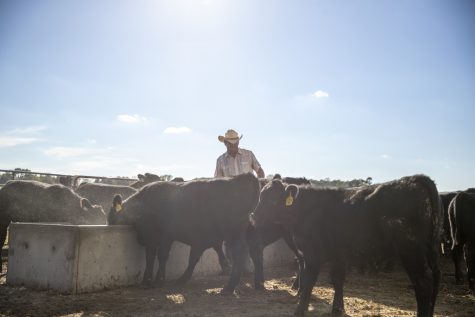
The most common group of farmers affected by mental health concerns are those with children from ages 10 to 14, Brown said, and those that are renting their land rather than owning it, putting them in debt.
“We found this program was an important factor in the potential opportunities for drug use by those teenagers who have participated in the program,” Brown said. “Very widely, [ISU’s] research [program] is probably the top prevention program, certainly in the nation, if not in the world.”
Naig said the grant will help train past and current staff members how to recognize when someone is in crisis, and develop tools or information for those who are providing counseling to farmers.
“It is to enhance, really, it’s not creating something terribly new,” Naig said. “We’ve had the Iowa Concern Hotline for many years, dating back to the 80s…it’s all about promoting and expanding and enhancing what has already been a good foundation of support for folks.”
Naig added that the grant will help develop the state’s Agricultural Training Program and a new web-based program that will have a cohesive list of all the resources available to farmers.
“To me, it needs to be a combination of one, making sure that farmers themselves have greater access to or greater awareness of the resources available,” Naig said. “Then, of course, that’s important, but also then train the trainer. Make sure that those who are working with farmers are equipped and understand some of the unique characteristics of a farmer or farm operation.”
Farmers’ job unlike others
Steve Swenka, a Johnson County farmer who lives in Tiffin, Iowa, said working as a farmer is unlike other jobs, making it a challenge. He specializes primarily in purebred cattle, and spends his days completing cattle chores and also harvesting corn and other grains.
“It’s certainly not a 9:00 to 5:00 job, or a five-day-a-week job,” Swenka said. “It’s kind of a 24/7 type of job…you can certainly see where there could be a lot of stress and things like that could develop.”
He said during the middle of harvest season — which takes place majorly in October — and spring season, 18-hour work days are pretty common, and there is no such thing as a day off.
Swenka described the farmer economy as a “roller coaster ride.”
“You’ll have good years, you’ll have bad years. On a positive note…right now, we’re more on the high point of the roller coaster,” he said. “Grain prices are very, very attractive right now, maybe some of the best prices we’ve seen for a while.”
He said he was not aware of the hotline before the Department of Agriculture’s announcement of the grant and its media exposure. It’s brought awareness not just for himself, but other farmers, as well.
“There’s naturally a need, you know, especially a job like farming and as stressful as it can be especially during certain times of the year,” Swenka said. “When the grant went through, and it brought more awareness to it, I think more than anything it’s kind of helping erase some of the stigma that used to be associated with mental health-type resources.”



